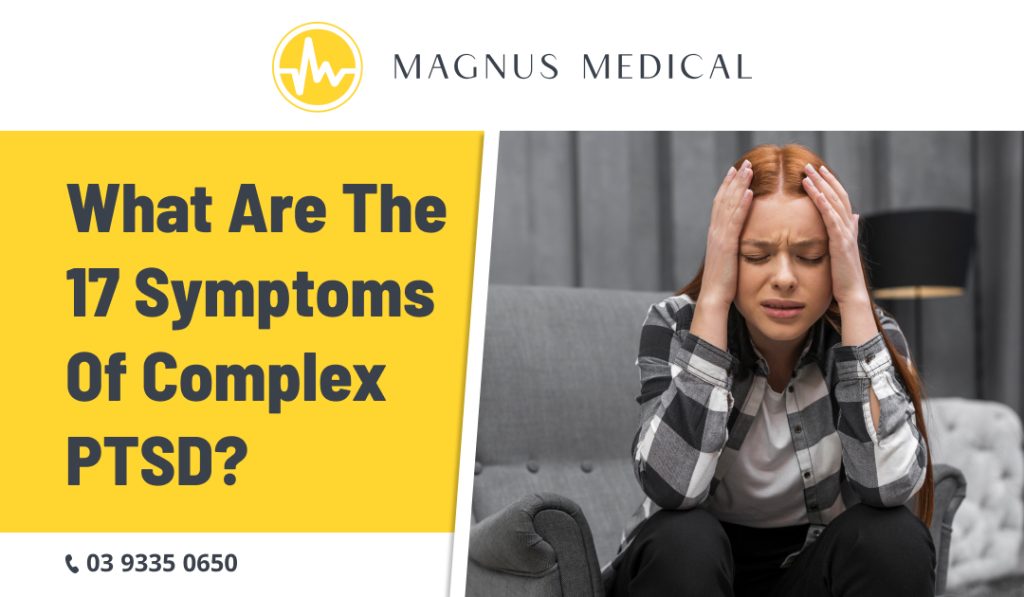Living with complex PTSD can feel like an ongoing struggle with overwhelming emotions, deep exhaustion, and overwhelming memories. These things can affect every part of life, including self-worth, relationships, and physical health. If you or someone you love is struggling with PTSD, you must first understand what causes it. While healing is not always easy, identifying the symptoms and seeking the right support can help you recover from PTSD.
What is Complex PTSD?
After experiencing a traumatic event, post-traumatic stress disorder (PTSD) can develop, especially in situations where a person feels unable to escape. Unlike PTSD, which is often caused by a single event, C-PTSD is caused by long-term trauma, such as domestic violence, childhood abuse, captivity, war, medical trauma, or ongoing emotional neglect.
What are the 17 Symptoms of Complex PTSD?
The symptoms of complex PTSD affect nearly every aspect of a person’s functioning. Here are the 17 symptoms of complex PTSD:
- Persistent depression: Persistent sadness or depression may bring a sense of hopelessness that can persist for years. This low feeling can make daily activities difficult to perform.
- Inability to regulate emotions: Inability to regulate emotions might look like extreme mood swings or feeling overwhelmed by emotions. One moment, a person might feel relaxed and calm, the next, they are filled with anger. This condition occurs when trauma disrupts the brain’s normal emotional processing systems.
- Chronic anxiety: People with Complex PTSD may experience a constant state of worry and nervousness. This chronic anxiety stems from the nervous system remaining in a high-alert state long after the risk has passed. This anxiety manifests as symptoms like irregular heartbeat, shallow breathing, muscle tension, and digestive issues.
- Shame and guilt: Feelings of guilt and shame are common symptoms of Complex PTSD. Shame and guilt are among the two most difficult symptoms to overcome.
- Intrusive thoughts: People with Complex PTSD are flooded with emotional states that they experience during the trauma with no visual memories. Unwanted memories or intrusive thoughts can occur at any time, disrupting peace of mind.
- Dissociation: Dissociation starts as a way for the mind to protect itself during trauma, helping you mentally escape when you can’t physically. But it can continue even after the danger is over.
- Hypervigilance: Always being on high alert for danger is exhausting but common in Complex PTSD. Hypervigilance means constantly scanning for threats and getting startled very easily.
- Avoidance behaviors: Avoiding places, activities, thoughts, or people that might trigger trauma memories is a natural protective mechanism. However, this avoidance behavior can limit a person’s life. Someone might avoid career opportunities, social gatherings, and relationships because they somehow are related to the traumatic past. Over time, these avoidance behaviors can prevent healing.
- Self-isolation: Withdrawing from family and friends is a common symptom of complex PTSD. Self-isolation develops from various factors, such as trust issues, shame, feeling different, or fear of being triggered. This isolation worsens over time, which can make it difficult to recover from C-PTSD.
- Self-destructive behaviors: Self-destructive behaviors include gambling, substance abuse, self-harm, or other addictions.
- Difficulty trusting others: People with C-PTSD often struggle with relationships as they expect harm or betrayal.
- Aggression: Sudden irritability and anger are common in Complex PTSD. This symptom can affect both the individual and their loved ones.
- Negative self-perception: Individuals with C-PTSD hold negative beliefs about themselves.
- Difficulty concentrating: This difficulty focusing stems from various factors, such as intrusive thoughts affecting mental processes, hypervigilance diverting attention to threats, and sleep disturbances disrupting cognitive function.
- Chronic fatigue: The constant state of emotional management, sleep disturbance, and hyperarousal leads to exhaustion for many people with C-PTSD.
- Sleep disturbance: Problems with sleep, such as nightmares, insomnia, or restless sleep, affect most people with C-PTSD.
- Physical symptoms: Common physical symptoms include digestive problems, chronic pain, headaches, and autoimmune issues.
When Should You See A Doctor?
If you or someone you love is experiencing symptoms of C-PTSD, you need to talk to a doctor. They can refer you to mental health experts, such as a psychologist or psychiatrist. You can also reach out to our Psychologist Glenroy at Magnus Medical Clinic to get personalized treatment for C-PTSD.
Conclusion
Identifying and understanding these 17 symptoms of complex PTSD is an important step toward getting the right treatment. You can contact Magnus Medical, a trusted Glenroy Medical Centre, to take the first step toward healing.
Other Useful link:
Glenroy gp
